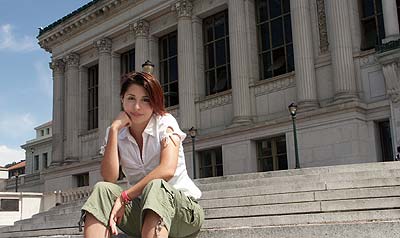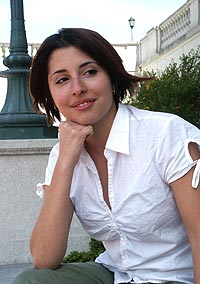UC Berkeley Web Feature
 |
Perin Gurel, English and American Studies major and a finalist for the University Medal. (BAP photos) |
From Istanbul to Berkeley, Perin Gurel is on the lookout for new challenges
BERKELEY – When Perin Gurel transferred to UC Berkeley from Bogazici University in Istanbul, she felt like a kid in a candy store. In contrast to the rigid, structured system of Turkish universities, Berkeley's thick course catalog offered so many choices that Gurel's head spun. However, she knew she had only limited time in the candy store - four semesters, to be exact - so she quickly began ingesting as much of her new alma mater as possible.
The University Medal
Finalists: |
By the end of her first semester at UC Berkeley, Gurel had declared a double major in American Studies and English. "When you're in America, you should study America," she says, as if this were an obvious choice of major for someone whose first language is Turkish (she is also fluent in German and working on French). By her fourth semester, she was a finalist for the University Medal, Berkeley's most prestigious student honor.
Looking past the burkas
At the same time as Gurel was learning about America, she was educating friends and classmates - and even her professors - about her home country and region. She tutors faculty in the Turkish language and translates texts for UC Berkeley professor Kiren Chaudhry. Finding herself the only non-American in an Introduction to Feminism class her first semester, she gamely tried to explain how feminism as it is practiced in the United States was often not applicable to the situations of women in emerging countries.
That experience inspired her to found Students for Transnational Feminism, a discussion group dedicated to challenging stereotypes of Middle Eastern women as passive victims of patriarchy. Gurel then took the discussion group to the next level, transforming it into a DeCal class, English 198 - Introduction to Transnational Feminism, that she taught along with other members in fall 2003 and spring 2004.
Gurel is infectiously passionate about many things - reading literature and daily newspapers, the pitfalls of nationalism, and her volunteer work socializing homeless animals. But when she talks about the importance of a transnational view of feminism, sparks fly off her.
"After 9/11, there were all these monolithic portraits of Middle Eastern women as oppressed and in need of rescuing. The news showed nothing that reflected their individuality and cultural diversity," she argues. "Americans see women in burkas on TV as symbols of male oppression, but women in Afghanistan might see images of women wearing bikinis and suffering in high heels, and think that's oppressive."
The real pitfall, she explains, is attempting to export - or worse, blindly force - American-style feminism on cultures that may not be ready for it yet. "Many of these women already had culturally specific feminist movements before the West suddenly discovered their oppression," she says. "We need to listen to the individual voices in each culture, and not assume that 'We are all sisters' so 'Let us save you from your men.' Burkas are not the most important thing on Afghani women's minds. They're worried about feeding their families."
The U.S. wars in Afghanistan and Iraq have been difficult for Gurel. She dislikes nationalism of any kind for the way it dehumanizes the enemy. "Iraq is Turkey's neighbor, although of course we haven't been very lovey-dovey. When I saw the Iraqi faces on TV, they looked Turkish to me," she says. "I got very depressed. All of these people are someone's father or brother, someone's child, and nationalism makes you lose sight of that."
Family traditions
Growing up in Istanbul, Gurel had two strong female role models who instilled in her an appetite for education. At a time when few Turkish women worked outside the home, her grandmother was an educator; Gurel's mother followed in her footsteps as an English teacher. Gurel taught herself to read by the age of five, and preferred playing school with her dolls to playing house.
 'Americans see women in burkas on TV as symbols of male oppression, but women in Afghanistan might see images of women wearing bikinis and suffering in high heels, and think that's oppressive.' -Perin Gurel |
UC Berkeley is actually the third university of her college career. The Turkish higher education system assigns students to a university based on a standardized test, and Gurel's score did not allow her to go to her first choice. "Imagine if the SAT was the single thing that decided where you would go to school!" she says indignantly. "But I was able to transfer to Bogazici University after one year."
Still, Gurel sought a greater academic challenge. And when she fell in love with Matt Silva, an UC Santa Barbara student traveling through Turkey, she decided to broaden her education by continuing it in Silva's home state. They were married last year, shortly after he graduated from UCSB; Gurel's ever-present smile gets even wider when talking about her husband.
At UC Berkeley, she has particularly relished the interdisciplinary nature of American Studies. "In my first semester I took an American history class to fulfill a requirement, and it opened my eyes so much," she explains. "The professor used a lot of biographies and works of literature in his teaching. I had to change all my preconceived notions about American literature when I read it in its historical and social context."
Gurel is working on an honors thesis for English and American Studies, on the eugenics movement of the 1920s and 1930s and its connection to American literary modernism, that she hopes will unite science studies and literary theory. "You can get too comfortable in a field," she says. "Once you know how to write an English paper, it's easy to just write a paper. But when you can also put in history, sciences, folklore, that makes it much more fun and interesting to write."
Her thesis director, English professor Ron Loewinsohn, has only the highest praise for both her analytical and writing skills. "It's very difficult to teach a student how to imagine the kind of question that will unlock a text. I don't know where Perin acquired this invaluable gift, but she certainly has it," he wrote when recommending her for the Medal.
Mover and shaker
Another faculty member, anthropology and folklore professor Alan Dundes, persuaded Gurel to take his graduate seminar on folklore simultaneously with the undergraduate one she was already enrolled in. Gurel was nervous, but decided to give it a try. She earned an A-plus in both classes, and her work on Turkish folklore earned his lasting admiration. "I know that she has many intellectual interests of which folklore is only one, but I believe she has the possibility of becoming one of the great folklore scholars of the 21st century," Dundes wrote.
As much as she enjoys unraveling folklore, Gurel intends to apply to graduate school for rhetoric, or modern thought and literature, or maybe the history of consciousness. "I want to study something that combines everything I'm interested in. I don't want to be limited yet, but try to find out all I can before I narrow my focus," she explains.
Ultimately, she wants to be a college professor, and to do so in many countries. That's the only way to really get to know them, she explains, having also lived in Germany and Belgium during summers as a high school student. "I don't want to get too comfortable somewhere and forget what's out there," she explains. "You just get one life and there's only one world - it's really limiting to stay in one country. You have to shake things up for yourself from time to time."
Or as Gurel prefers, frequently.


 University
Medalist Margaret Ann-Chia Chow urges new students
to make campus "feel like home"
University
Medalist Margaret Ann-Chia Chow urges new students
to make campus "feel like home" Leadership
depends on dialogue, says ex-ASUC president Jesse
Gabriel
Leadership
depends on dialogue, says ex-ASUC president Jesse
Gabriel From
Istanbul to Berkeley, Perin Gurel is on the
lookout for new challenges
From
Istanbul to Berkeley, Perin Gurel is on the
lookout for new challenges David
Young relies on faith and family to bring
his vision to life
David
Young relies on faith and family to bring
his vision to life Would-be
physician Maria Garcia gives back to the
Latin-American community
Would-be
physician Maria Garcia gives back to the
Latin-American community After
changing her major and her mind, Deann Del Rio
takes on modern medicine
After
changing her major and her mind, Deann Del Rio
takes on modern medicine